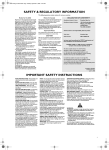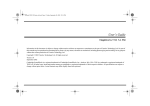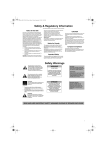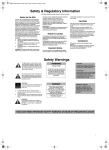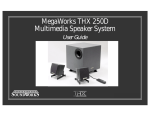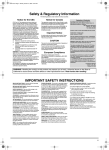Download E-Mu PM5 Owner`s manual
Transcript
Owner’s Manual © 2005 E-MU Systems All Rights Reserved Version 1.0 E-MU World Headquarters E-MU Systems 1500 Green Hills Road Scotts Valley, CA 95066 USA 02MF151500000 Rev. A Europe, Africa, Middle East Creative Labs Ballycoolin Business Park Blanchardstown Dublin 15 IRELAND E-MU Japan Creative Media K K Kanda Eight Bldg., 3F 4-6-7 Soto-Kanda Chiyoda-ku, Tokyo 101-0021 JAPAN Creative Professional DON Analog.book Page i Wednesday, August 31, 2005 2:57 PM SAFETY & REGULATORY INFORMATION The following sections contain notices for various countries: Notice for the USA FCC Part 15: This equipment has been tested and found to comply with the limits for a Class B digital device, pursuant to Part 15 of the FCC Rules. These limits are designed to provide reasonable protection against harmful interference in a residential installation. This equipment generates, uses, and can radiate radio frequency energy and, if not installed and used in accordance with the instructions, may cause harmful interference to radio communications. However, this notice is not a guarantee that interference will not occur in a particular installation. If this equipment does cause harmful interference to radio or television reception, which can be determined by turning the equipment off and on, the user is encouraged to try one or more of the following measures: ❒ Reorient or relocate the receiving antenna. ❒ Increase the distance between the equipment and receiver. ❒ Connect the equipment to an outlet on a circuit different from that to which the receiver is connected. ❒ Consult the dealer or an experienced radio/ TV technician. CAUTION: To comply with the limits for the Class B digital device, pursuant to Part 15 of the FCC Rules, this device must be installed with computer equipment certified to comply with the Class B limits. All cables used to connect the computer and peripherals must be shielded and grounded. Operation with non-certified computers or non-shielded cables may result in interference to radio or television reception. Modifications Any changes or modifications not expressly approved by the guarantee of this device could void the user’s authority to operate the device. Notice for Canada This apparatus complies with the Class B limits for radio interference as specified in the Canadian Department of Communications Radio Interference Regulations. Cet appareil est conforme aux normes de CLASSE “B” d’interference radio tel que spe’cifie’ par le Ministère Canadien des Communications dans les règlements d’interfèrence radio. Important Notice Your product has a serial number. Write this serial number down and keep it in a secure area. CAUTION Take care to prevent the accidental operation of your new speakers at excessive sound pressure levels! If you do not hear sound from your new speakers, keep the volume controls at a low levels while trying to restore sound. This will prevent accidental operation at uncomfortably loud levels. DECLARATION OF CONFORMITY Manufacturer/Importer's Name: Creative Labs, Inc. Manufacturer/Importer's Address: 1901 McCarthy Boulevard Milpitas, CA. 95035 United States Tel: (408) 428-6600 declares under its sole responsibility that the product Trade Name:: Creative Labs Model Numbers: MF1510/MF1515 has been tested according to the CISPR13 requirement and found compliant with the following standards: EMI/EMC: CISPR 13 : 2003, FCC Part 15 Subpart B Complies with Canadian ICES-003 Class B European Compliance This product conforms to the following: EMC Directive 89/336/EEC as amended by 92/31/ EEC and 93/68/EEC. Mains operated products for the European market comply with LVD Directive 73/23/EEC as amended by 93/68/EEC. Communication / RF wireless products for the European market comply with Directive R&TTE 1999/5/EC. This device complies with part 15 of the FCC Rules. Operation is subject to the following two conditions: (1) This device may not cause harmful interference, and (2) This device must accept any interference received, including interference that may cause undesirable operation. Ce matériel est conforme à la section 15 des régles FCC. Son Fonctionnement est soumis aux deux conditions suivantes: (1) Le matériel ne peut étre source D'interférences et (2) Doit accepter toutes les interférences reques, Y compris celles pouvant provoquer un fonctionnement indésirable. Compliance Manager Creative Labs, Inc. June 1, 2005 IMPORTANT SAFETY INSTRUCTIONS READ INSTRUCTIONS - Read all safety and operating instructions before operating the product. RETAIN INSTRUCTIONS - Keep all safety and operating instructions for future reference. HEED WARNINGS - Take note of all warnings on the product and in the operating instructions. FOLLOW INSTRUCTIONS - All operating and usage instructions should be followed. CLEANING - Unplug this product from the power source before cleaning. Do not use liquid or aerosol cleaners. Use a dry cloth for cleaning. ATTACHMENTS - Do not use attachments or accessories not recommended by Creative as they may cause hazards. WATER AND MOISTURE - Do not use this product near any water source or water hazard - for example, near a bath tub, wash bowl, kitchen sink, or laundry tub; in a wet basement; or near a swimming pool; and the like. PLACEMENT - Place the product on a stable surface or recommended stand, or sold with the product. Otherwise, the product may fall and cause injury to a person, and damage to the product. Follow the manufacturer’s instructions for mounting the product. VENTILATION - To ensure reliable operation and to prevent overheating, do not block or cover ventilation openings and slots with fabrics or impermeable material. Do not place in a built-in installation such as a bookcase or a rack unless there is proper ventilation, or Creative’s instructions have been adhered to. “The speaker shall be positioned 5-cm (maximum) behind the front edge, 15-cm (minimum) free space along the sides and 30-cm (minimum) free space from top and depth behind. HEAT - Do not place this product anywhere near heat sources such as radiators, stoves, and other products (including amplifiers) that produce heat. POWER SOURCES - This product is specifically designed for operation within the electrical range(s) specified on the provided power adapter and use outside of this range shall be at your own risk. Please contact your local electric utility company if you have any questions about the electrical voltage at your intended location of use. POWER CORD - Grounding-type Plug - Do not defeat the Safety purpose of grounding-type plug. A grounding-type plug has two blades and a third grounding prong. The third prong is provided for your safety. If the provided plug does not fit into your socket, consult an electrician for replacement of the obsolete outlet. POWER-CORD PROTECTION - Arrange the power-cords to minimize the risk of damage from being walked on or pinched. Pay particular attention to the area near the plug head, the power source outlet and the connection from the product. LIGHTNING - Unplug the product from the power source during lightning storms or if unused for long periods of time. This will prevent lightning and power-line surge damage to the product. OVERLOADING - Do not overload wall outlets, extension cords, or integral power circuits as this can result in a risk of fire or electric shock. OBJECT AND LIQUID ENTRY - Never push any object through the product’s openings, as they can result in a fire, electric shock or damage. Do not spill liquids on the product. SERVICING - Do not attempt to service the product yourself. Refer all servicing to qualified service personnel. DAMAGE REQUIRING SERVICE - Unplug the product from the power source. Call for servicing when: c)the power-supply cord or plug is damaged. d)objects have fallen through or liquids have been spilled into the product’s openings. e)the product has been exposed to rain or water. f)the product does not operate normally when following g)the operating instructions. h)the product behaves differently. i)the product has been dropped or damaged in any way. REPLACEMENT PARTS - When replacing parts, check that the service technician has used replacement parts specified by Creative, or have the same characteristics as the original parts. Unauthorized substitutions may result in fire, electric shock, or other hazards. SAFETY CHECK - After servicing or repairing the product, get the service technician to perform safety checks to be sure that the product is working properly. WARNING: TO REDUCE THE RISK OF FIRE OR ELECTRIC SHOCK ❒ DO NOT EXPOSE THIS APPARATUS TO RAIN OR MOISTURE ❒ DO NOT EXPOSE THIS APPARATUS TO DRIPPING OR SPLASHING FLUIDS, AND ENSURE THAT NO OBJECTS FILLED WITH LIQUIDS — SUCH AS VASES — ARE PLACED ON THE APPARATUS. ❒ THE SPEAKER SHALL BE CONNECTED TO A MAINS SOCKET OUTLET WITH PROTECTIVE EARTHING CONNECTION The mains plug and appliance couple are used as the disconnecting devices. The speaker shall be placed near a socket outlet which is easily accessible and readily operable. i DON Analog.book Page ii Wednesday, August 31, 2005 2:57 PM SAFETY WARNINGS The lightning flash arrowhead within an equilateral triangle is intended to alert the user to the presence of uninsulated, “dangerous voltage” within the product’s enclosure, that may be of sufficient magnitude to constitute risk of electric shock to persons. The exclamation point within an equilateral triangle is intended to alert the user to the presence of important operating and maintenance (servicing) instructions in the literature accompanying this product. CAUTION: This symbol indicates that the marked item may be Hot and should not be touched without proper care. ❒To minimize the risk of burns and other injuries to children, position the device such that hot surfaces are out of their reach. ❒To minimize the risk of fire, keep flammable materials like paper and cloth (for example, curtains) away from the hot surface. WARNING DO NOT OPEN TO PREVENT THE RISK OF ELECTRIC SHOCK, DO NOT REMOVE SPEAKER COVERS (OR BACKS). NO USER-SERVICEABLE PARTS INSIDE. REFER SERVICING TO QUALIFIED SERVICE PERSONNEL. AVISQUE POUR EVITER TOUT RISQUE DE CHOC ELECTRIQUE, NE PAS DEMONTER LE COUVERCLE DU HAUT PARLEUR. AUCUN ENTRETIEN DES PIECES INTERIEURES N EST REQUIS. TOUT SERVICE D ENTRETIEN NE DOIT ETRE EFFECTUE QUE PAR DU PERSONNEL D ENTRETIEN QUALIFIE. CAUTION: TO PREVENT THE RISK OF ELECTRIC SHOCK, MATCH WIDE BLADE OF PLUG TO WIDE SLOT. INSERT CAREFULLY. ATTENTION: POUR EVITER LES CHOCS ELECTRIQUES, INTRODUIRE LA LAME LA PLUS LARGE DE LA FICHE DANS LA BORNE CORRESPONDANTE DE LA PRISE ET POUSSER JUSQU AU FOND. IMPORTANT NOTICE: Your product has a serial number. Write this serial number down and keep it in a secure area. READ AND HEED IMPORTANT SAFETY WARNING ON REAR OF SPEAKER ENCLOSURE WARNING: The cord(s) included with this product may contain chemicals known to the State of California to cause cancer and birth defects or other reproductive harm. Wash hands after handling. The use of the WEEE Symbol indicates that this product may not be treated as household waste. By ensuring this product is disposed of correctly, you will help protect the environment. For more detailed information about the recycling of this product, please contact your local authority, your household waste disposal service provider or the shop where you purchased the product. ii DON Analog.book Page 1 Wednesday, August 31, 2005 2:57 PM E-MU PM5 Precision Monitor Thank you for purchasing the E-MU® PM5 Precision Monitor. This extremely compact two-way, bi-amplified near-field reference monitor features custom audiophile amplifiers, world-class drivers, and innovative cabinet design to deliver hyper-accurate audio reproduction for all your critical monitoring needs. This package includes: • 1 x E-MU PM5 Precision Monitor • 1 x Power Cord • 1 x Owner's Manual • 1 x Warranty and Support Information Notes and tips Items of special interest are presented in this document as notes and tips: • Note. This highlights additional or important information about a feature. • Tip. This tells you about shortcuts or hints relating to a feature. Contents Overview ........................................... 2 Connecting Your Speaker ................ 2 Positioning Your Speaker ................. 3 Adjusting Speaker Controls ............. 4 To set input sensitivity ................. 4 To set tone controls .................... 4 Technical Specifications ................... 5 Information in this document is subject to change without notice and does not represent a commitment on the part of E-MU Systems, Inc. No part of this manual may be reproduced or transmitted in any form or by any means, electronic or mechanical, including photocopying and recording, for any purpose without the written permission of E-MU Systems, Inc. Version 1.0 September 2005 © 2005. E-MU Systems, Inc. All rights reserved. E-MU is a registered trademark of E-MU Systems, Inc. in the United States and in other countries. The Creative logo is a registered trademark of Creative Technology Ltd. in the United States and in other countries. All other logos, brand or product names are trademarks or registered trademarks of their respective holders and are hereby recognized as such. All specifications are subject to change without notice. Use of this product is subject to a limited warranty. Actual contents may differ slightly from those pictured. 1 DON Analog.book Page 2 Wednesday, August 31, 2005 2:57 PM Overview The following section introduces you to the different components on your speaker. Speaker Components 1 Combination XLR/TRS balanced analog input connector 2 Balance (BAL)/Unbalance (UNBAL) switch Select either balanced (XLR or TRS) or unbalanced (RCA) analog inputs with this switch. 3 RCA unbalanced analog input connector 4 Input sensitivity control knob Adjusts the input sensitivity of your speaker. 5 Attenuation switches • Adjust the bass roll off with the LF (Low Frequency) switch • Adjust the treble tilt with the HF (High Frequency) switch • By default, both switches are set to zero. 6 Power socket • Disconnect the power adapter cable from the power socket if you do not intend to use your speaker for several days • Make sure that the voltage rating of your speaker matches the voltage standard of your country. 7 ON/OFF switch 8 Power LED • Lights up in blue when your speaker is turned on • Lights up in red when the overload protection circuitry engages. 1 2 3 4 5 6 7 8 Connecting Speakers Your speaker features a combination XLR/TRS balanced analog input connector and an RCA unbalanced analog input connector for connecting a wide variety of analog audio input devices. • Before connecting your speaker, make sure that the Input sensitivity control knob is turned fully counterclockwise. • Do not connect more than one audio input device to your speakers at any one time as this will cause the mixing of input signals and result in unwanted noise. You may hear a thump from your speaker when you turn it on and off. Make sure that your speaker is the last device to be turned on and the first device to be turned off in your audio set up to prevent this from occuring. 1 = Ground/Shield 2 = Hot (+) 3 = Cold (-) 2 3 Tip = Hot (+) 2 Ring = Cold (-) 1 3 Sleeve = Ground/Shield 1 Connector Connection 1 Balanced ¼-inch TRS 2 Balanced XLR male Connect either to the combination XLR/TRS balanced analog input connector 3 Unbalanced RCA Connects to the RCA unbalanced analog input connector After you have connected your audio device to your speaker, make sure that you select the appropriate input connection type using the Balanced (BAL)/Unbalanced (UNBAL) switch . 2 DON Analog.book Page 3 Wednesday, August 31, 2005 2:57 PM Positioning Speakers How you position your speaker can greatly affect your speaker’s performance. While many factors such as room shape and wall material affect performance, there are general tips that you can follow to maximize performance in any room. The following section provides tips on speaker positioning. L R 30° 30° 2 High frequency driver Low frequency driver 3 1 Speaker positioning tips 1 Place your speakers on a flat, stable surface to minimize vibration. 2 Position your speakers at the same height, and maintain the same speaker-to-wall and speaker-to-listener distance for both speakers. 3 The acoustic axis of each speaker falls on the mid-point between the speaker’s high frequency driver and low frequency driver. Position your speakers such that the acoustic axes are at the same height as your ears. 3 DON Analog.book Page 4 Wednesday, August 31, 2005 2:57 PM Adjusting Speaker Controls To set input sensitivity You can match the input sensitivity of your speakers to your output source device by adjusting the Input sensitivity knob . • Make sure that the Power LED does not light up in red when you adjust the Input sensitivity knob. • Adjust the input sensitivity to your speaker to match the source signal in order to avoid unnecessary clipping of the output signal. Scales for input sensitivity control dB dBu This is the input sensitivity For balanced professional use, scale in decibels as shown on the recommended input the back panel of your sensitivity level is +4dBu. speaker. V An input sensitivity of 0.66V will result in maximum output only when the Input sensitivity knob is turned fully clockwise. To set tone controls You can use the Attenuation switches to adjust the bass roll off (LF) and treble tilt (HF) of your speaker. The following graph illustrates how bass roll off and treble tilt affect the response of your speaker. 4 DON Analog.book Page 5 Wednesday, August 31, 2005 2:57 PM Technical Specifications General Type Two-way, bi-amplified near-field reference monitor Frequency Response 67Hz - 20kHz (±2.5dB) Maximum Sound Pressure Level, short term Single: ≥100dB SPL @1m Pair: ≥103dB SPL @1m Drivers High Frequency: Type: Neodymium Soft Dome Size: 25.4mm (1") Low-Frequency: Type: Glass Fiber Cone Size: 127mm (5") Dimensions Height: 290mm (11.5") Width: 175mm (6.9") Depth: 245mm (9.7") Weight 6.5kg (14.3lbs) Power 120V, 60Hz Crossover Network Type Active second-order Butterworth Inputs Input 1: XLR female balanced Input 2: ¼" Jack socket balanced Input 3: RCA unbalanced Input sensitivity control range -21 dB to 0dB Input impedance Balanced: 47K ohms Unbalanced: 47K ohms Crossover frequency 2.5kHz Amplifiers Type Custom discrete with Class-A input stage and MOSFET output stages High Frequency Amplifier Power: 40W RMS into 4 ohms Signal-to-Noise Ratio, referred to full output: > 98dB Distortion: THD < 0.2% Low Frequency Amplifier Power: 40W RMS into 4 ohms Signal-to-Noise Ratio, referred to full output: > 98dB Distortion: THD < 0.2% Fuse ratings 120Vac 60Hz model: T1AL. 250Vac. T1AL (where T = Time lag, Fuse rating 1A and L = low breaking capacity.) 220V-240Vac 50/60Hz model: T500mAL. 250Vac. T500mAL (where T = Time lag, Fuse rating 500mA and L = low breaking capacity.) 5 DON Analog.book Page 6 Wednesday, August 31, 2005 2:57 PM Notes 6









